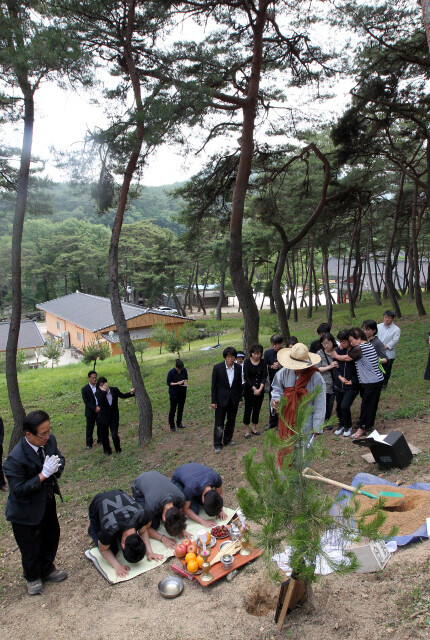hankyoreh
Links to other country sites 다른 나라 사이트 링크
To address school violence, treat students’ mental health

By Lee Jae-hoon, staff reporter
The Journal of Child Psychology and Psychiatry recently published the results of a study by Oxford University and the University of Queensland. For the study titled ‘A Prospective Longitudinal Study of Children’s Theory of Mind and Adolescent Involvement in Bullying’, the authors interviewed 2,232 pairs of twins at the ages of 5, 7, 10 and 12.
They divided the 2,232 pairs of 12-year-old kids into two separate groups according to their experience of having been bullied or suffered from violence at school.
The researchers measured the subjects’ ability to empathize. The average empathic ability quotient of the children who had no experience of school violence was 5.06 while the bullies and their victims were 4.22 and 4.24 respectively. Children who had both suffered bullying and acted as bullies had the lowest rating at an average of 3.64.
These results were introduced by the Korean Academy of Child and Adolescent psychiatry at an event called, ‘The public hearing for mental health measures for preventing school violence’ at the Korea Press Center in Seoul on June 5.
According to Kim Bung-nyun, a psychiatry professor at Seoul National University, emphatic ability is divided into affective empathy and cognitive empathy. Affective empathy is the ability to have consideration and sympathy for other people. When this ability is lacking, people tend to dominate or abuse other people. This ability is what bullying students don’t have.
Cognitive empathy is the ability to understand situations by reading people’s facial expressions, their way of speaking, or their demeanor. When the students are short of this ability, they can be easily targeted for bullying because they don’t know how to react properly to each situation.
Especially for the bullying students, the experience of domestic violence in childhood forms their propensity to act violently as well as their lack of affective empathy. Feelings of insecurity caused by one’s financial and social background, making it harder to control one’s impulses, are an important factor.
Those students, who lack the abilities to emphasize and control their impulses, use violence when they enter puberty and encounter new challenges.
“Judgments like, ‘Bullies are always like that’ or ‘It is important to punish them’, are not helpful for kids’ development. Education only focused on English and mathematics cannot solve the school violence problem,” said professor Kim.
He added, “We have to enrich the quality of mental health through art education. We also have to check problems before the violence arises, through social and financial supports to the single parent-families and so on.
"Not only the students who committed or suffered from school violence but also the students who watched the violence with folded arms show signs of mental stress up to their adulthood. It is because they also become desensitized to violence," said Jo In-hui, a psychiatry professor at Gachon University.
"There are no measures to improve mental health in the comprehensive plan by government to eradicate school violence," she pointed out. "Government should establish institutional measures to educate and evaluate mental health problems, then treat them properly."
Violence among students has been brought to the center of public discourse in South Korea by a series of shocking incidents. The southern city of Daegu has over the last six months been the site of suicides by 8 students and ttempts by 2 others.
Police are investigating the circumstances of Kim, 16, a first year high-school student from Daegu who committed suicide on June 2. Kakao Talk messages between Kim and a boy he knew from a soccer club have been under analysis. The messages show that on the day of his suicide, Kim wrote that the other boy planned to beat him that night. He may have ended his life in order to avoid another violent encounter at school.
Translated by Kim Ji-seung, Hankyoreh English internPlease direct questions or comments to [english@hani.co.kr]

Editorial・opinion
![[Column] Park Geun-hye déjà vu in Yoon Suk-yeol [Column] Park Geun-hye déjà vu in Yoon Suk-yeol](https://flexible.img.hani.co.kr/flexible/normal/500/300/imgdb/original/2024/0424/651713945113788.jpg) [Column] Park Geun-hye déjà vu in Yoon Suk-yeol
[Column] Park Geun-hye déjà vu in Yoon Suk-yeol![[Editorial] New weight of N. Korea’s nuclear threats makes dialogue all the more urgent [Editorial] New weight of N. Korea’s nuclear threats makes dialogue all the more urgent](https://flexible.img.hani.co.kr/flexible/normal/500/300/imgdb/original/2024/0424/7317139454662664.jpg) [Editorial] New weight of N. Korea’s nuclear threats makes dialogue all the more urgent
[Editorial] New weight of N. Korea’s nuclear threats makes dialogue all the more urgent- [Guest essay] The real reason Korea’s new right wants to dub Rhee a founding father
- [Column] ‘Choson’: Is it time we start referring to N. Korea in its own terms?
- [Editorial] Japan’s rewriting of history with Korea has gone too far
- [Column] The president’s questionable capacity for dialogue
- [Column] Are chaebol firms just pizza pies for families to divvy up as they please?
- [Column] Has Korea, too, crossed the Rubicon on China?
- [Correspondent’s column] In Japan’s alliance with US, echoes of its past alliances with UK
- [Editorial] Does Yoon think the Korean public is wrong?
Most viewed articles
- 1‘We must say no’: Seoul defense chief on Korean, USFK involvement in hypothetical Taiwan crisis
- 2N. Korean delegation’s trip to Iran shows how Pyongyang is leveraging ties with Moscow
- 3‘Weddingflation’ breaks the bank for Korean couples-to-be
- 4Will NewJeans end up collateral damage in internal feud at K-pop juggernaut Hybe?
- 546% of cases of violence against women in Korea perpetrated by intimate partner, study finds
- 6[Column] Park Geun-hye déjà vu in Yoon Suk-yeol
- 7“Parental care contracts” increasingly common in South Korea
- 8[Column] Yoon’s first 100 days should open our eyes to pitfalls of presidential system
- 9[Interview] Dear Korean men, It’s OK to admit you’re not always strong
- 10[Editorial] New weight of N. Korea’s nuclear threats makes dialogue all the more urgent